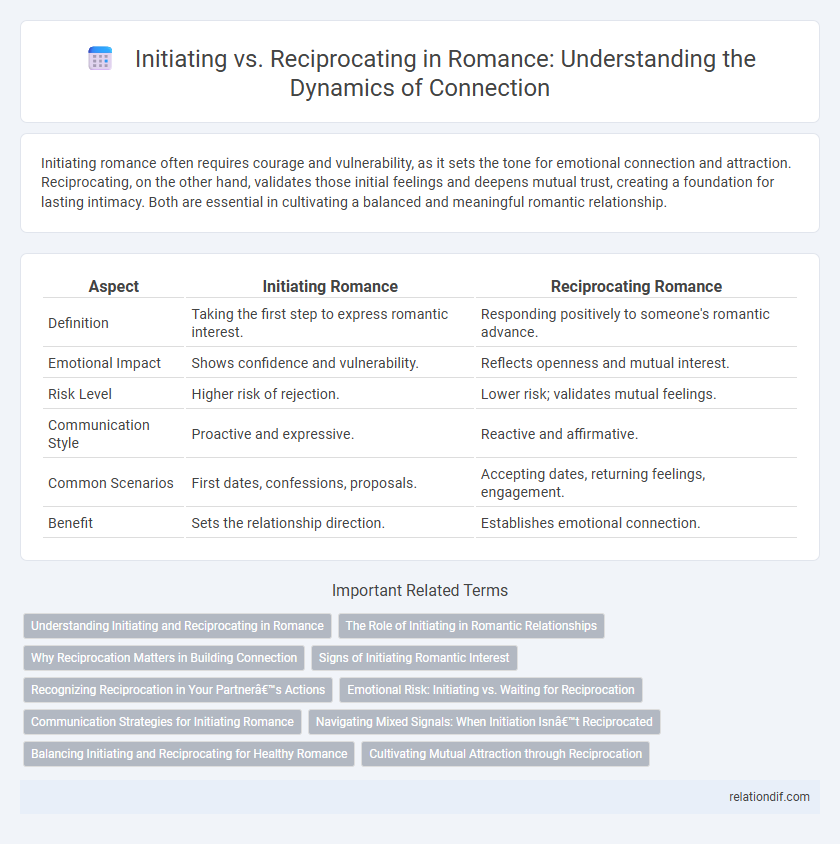Initiating romance often requires courage and vulnerability, as it sets the tone for emotional connection and attraction. Reciprocating, on the other hand, validates those initial feelings and deepens mutual trust, creating a foundation for lasting intimacy. Both are essential in cultivating a balanced and meaningful romantic relationship.
Table of Comparison
| Aspect | Initiating Romance | Reciprocating Romance |
|---|---|---|
| Definition | Taking the first step to express romantic interest. | Responding positively to someone's romantic advance. |
| Emotional Impact | Shows confidence and vulnerability. | Reflects openness and mutual interest. |
| Risk Level | Higher risk of rejection. | Lower risk; validates mutual feelings. |
| Communication Style | Proactive and expressive. | Reactive and affirmative. |
| Common Scenarios | First dates, confessions, proposals. | Accepting dates, returning feelings, engagement. |
| Benefit | Sets the relationship direction. | Establishes emotional connection. |
Understanding Initiating and Reciprocating in Romance
Initiating romance involves expressing interest and making the first move, which signals confidence and genuine attraction. Reciprocating, on the other hand, requires recognizing and responding to these signals appropriately, fostering mutual trust and emotional connection. Understanding the balance between initiating and reciprocating enhances communication, deepens intimacy, and strengthens relationship foundations.
The Role of Initiating in Romantic Relationships
Initiating in romantic relationships establishes a foundation of confidence and interest, often signaling emotional availability and intent to pursue deeper connections. Taking the first step can differentiate genuine attraction from passive curiosity, fostering clearer communication and mutual understanding. This proactive behavior often encourages reciprocation, setting the rhythm for the relationship's emotional dynamic and growth.
Why Reciprocation Matters in Building Connection
Reciprocation in romance deepens emotional bonds by signaling mutual interest and respect, fostering trust and vulnerability. When feelings and efforts are mirrored, partners develop a sense of security that encourages open communication and intimacy growth. This balance creates a dynamic where both individuals feel valued, reinforcing a lasting and meaningful connection.
Signs of Initiating Romantic Interest
Eye contact lingered longer than usual, subtle touches brushed against the hand, and engaged body language such as leaning in or mirroring movements are clear signs of initiating romantic interest. Verbal cues like playful teasing, sincere compliments, or initiating conversations about personal topics further signal a desire to connect. Observing these behaviors helps distinguish between someone actively expressing attraction versus merely responding to it.
Recognizing Reciprocation in Your Partner’s Actions
Recognizing reciprocation in your partner's actions involves paying close attention to their consistent efforts to match your emotional investments and gestures of affection. Subtle cues such as mirroring your body language, timely responses to messages, and spontaneous acts of kindness signal genuine interest and mutual care. Understanding these behaviors helps foster deeper connection and strengthens the foundation of a balanced romantic relationship.
Emotional Risk: Initiating vs. Waiting for Reciprocation
Initiating a romantic connection involves embracing emotional risk by openly expressing interest and vulnerability without assurance of mutual feelings. Waiting for reciprocation minimizes immediate exposure to rejection but can lead to missed opportunities and prolonged uncertainty. Balancing the courage to initiate with the patience to wait ensures a healthier emotional experience in developing romance.
Communication Strategies for Initiating Romance
Effective communication strategies for initiating romance emphasize clear, confident verbal and nonverbal cues that express genuine interest and emotional availability. Utilizing open-ended questions and active listening fosters rapport and encourages vulnerability, setting the foundation for mutual connection. Balancing directness with sensitivity helps navigate the delicate dynamics between initiating and reciprocating romantic interest.
Navigating Mixed Signals: When Initiation Isn’t Reciprocated
Navigating mixed signals requires understanding that initiating romantic interest does not always guarantee reciprocation, which can lead to emotional uncertainty. Recognizing subtle cues and respecting boundaries allows individuals to avoid misinterpretation and maintain healthy communication. Effective navigation of these dynamics enhances emotional intelligence and fosters more authentic connections in romantic relationships.
Balancing Initiating and Reciprocating for Healthy Romance
Balancing initiating and reciprocating in romance fosters mutual respect and emotional connection, essential for relationship longevity. Initiating expresses interest and vulnerability, while reciprocating validates those feelings and sustains intimacy. Maintaining this equilibrium prevents miscommunication and nurtures a healthy, dynamic partnership.
Cultivating Mutual Attraction through Reciprocation
Cultivating mutual attraction depends on the dynamic balance between initiating and reciprocating romantic gestures, where genuine interest is demonstrated through both actions. Initiating conveys confidence and intent, while reciprocating signals appreciation and emotional availability, strengthening the bond progressively. Consistent reciprocation nurtures trust and vulnerability, transforming initial sparks into a compelling and enduring romantic connection.
initiating vs reciprocating Infographic

 relationdif.com
relationdif.com